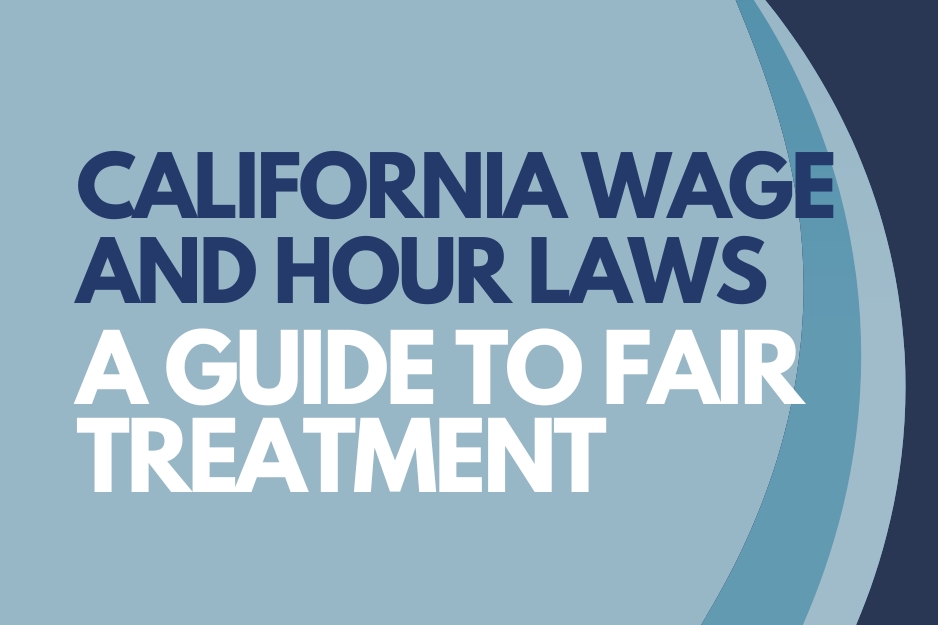
Facing Sexual Harassment in Los Angeles: Understanding Your Rights and Legal Protections
Sexual harassment in the workplace can leave lasting emotional, professional, and financial damage on victims. Whether you’re experiencing unwanted advances, inappropriate comments, or a hostile work environment, understanding the legal consequences for harassers and the protections available to you is crucial. In California, sexual harassment laws provide strong protections for employees, with serious repercussions for both individual harassers and the companies that fail to prevent or address such behavior. This guide examines what constitutes sexual harassment under California law, the legal consequences harassers face, and how victims can assert their rights in Los Angeles workplaces.
Don’t let the complexities of sexual harassment laws in Los Angeles overwhelm you. At RD Law Group APC, we’re here to guide you through every step of the process with professionalism and care. Reach out to us today at (424) 535-1500 or contact us to discuss your situation and explore your options for justice and resolution.

Understanding Sexual Harassment Under California Law
California offers some of the nation’s strongest protections against workplace sexual harassment. State law recognizes two primary categories of sexual harassment: quid pro quo harassment and hostile work environment harassment. Quid pro quo harassment occurs when submission to sexual conduct is made a condition of employment, either explicitly or implicitly. This might involve a supervisor threatening job loss if an employee refuses sexual advances or promising promotions in exchange for sexual favors.
Hostile work environment harassment creates an intimidating, offensive, or demeaning atmosphere that interferes with an employee’s ability to perform their job. This can include persistent unwanted sexual comments, displaying inappropriate material, leering, or other behaviors that create an uncomfortable workplace. California law also specifically prohibits using sexual conduct as the basis for employment decisions affecting a person, including decisions related to supporting or opposing legislation or other legislative processes.
The Process and Timeline of a Sexual Harassment Case in California
Understanding the process and timeline of filing a sexual harassment claim in California helps victims prepare for what lies ahead. Each step in the process has specific timelines and requirements that must be followed to preserve your legal rights. The journey from experiencing harassment to resolution typically follows these key steps:
-
Internal Reporting: California employers are required to have procedures for reporting harassment. Individuals who experience or observe harassment are strongly encouraged to identify the offensive behavior, advise the offender to stop, and report the harassment according to company policy. This step is important as it creates an official record and gives the employer an opportunity to address the issue.
-
Filing Administrative Complaints: Before filing a lawsuit, victims must file a complaint with either the California Civil Rights Department (CRD) or the federal Equal Employment Opportunity Commission (EEOC). In California, you generally have three years from the date of harassment to file this administrative complaint—significantly longer than many other states that allow only 180 or 300 days.
-
Investigation Phase: After filing, the administrative agency conducts an investigation that typically takes 6-12 months. During this time, they may interview witnesses, review documents, and gather evidence about the alleged harassment incidents.
-
Right-to-Sue: After filing with the CRD or EEOC, victims can request an immediate “right-to-sue” letter that allows them to proceed directly to court without waiting for the agency’s investigation to conclude. In Los Angeles County courts, sexual harassment cases typically take 12-24 months to reach resolution if they go to trial.
How RD Law Group Helps Sexual Harassment Victims in Los Angeles
Confronting sexual harassment requires understanding both your legal rights and the practical steps needed to assert them. In Los Angeles, victims have multiple avenues for seeking justice and holding harassers accountable. These include internal company procedures, government agency complaints, and civil lawsuits. Each path offers different remedies and requires specific knowledge to navigate effectively.
At RD Law Group APC, we understand that sexual harassment cases involve sensitive personal experiences and complex legal questions. Our approach combines legal knowledge with compassionate guidance, helping victims understand their options while preserving their dignity throughout the process. When evaluating your situation, we consider not just the legal strength of your case but also your personal goals—whether that’s compensation for damages, workplace policy changes, or simply the validation that comes from holding harassers accountable.
Legal Consequences for Sexual Harassers and Employers in Los Angeles
Sexual harassment carries serious legal consequences in California for both individual harassers and their employers. Understanding these potential penalties helps victims recognize the gravity of these violations and the strong legal protections available to them. For harassers, the legal consequences can be severe and far-reaching, potentially affecting their professional reputation, financial stability, and even freedom in cases involving physical assault. For employers, failure to prevent or address sexual harassment can result in significant liability, regulatory scrutiny, and damage to their business reputation.
Individual Liability for Sexual Harassers
Under California law, individuals who engage in sexual harassment can face personal liability separate from their employer’s liability. This means harassers may be required to pay damages from their own assets. Individual consequences can include monetary damages for emotional distress, punitive damages designed to punish particularly egregious behavior, and attorney’s fees. In cases involving physical contact or assault, harassers may also face criminal charges independent of civil liability.
California allows for individual supervisors to be held personally liable for harassment, unlike federal law which generally only permits employer liability. We’ve found that many clients are surprised to learn that individual harassers can be named as defendants in lawsuits, providing an additional avenue for accountability and potentially increasing the recoverable damages in severe cases.
Types of Sexual Harassment Behaviors and Their Legal Implications
Sexual harassment encompasses a wide range of behaviors, each carrying different legal implications. California law recognizes various forms of harassment, from verbal and nonverbal conduct to physical violations. Understanding how these behaviors are categorized helps victims identify actionable harassment and understand the potential legal consequences for the harasser. The severity of the behavior often correlates with the potential damages available and the likelihood of successful litigation.
Verbal, Nonverbal, and Physical Harassment
Sexual harassment manifests in various forms, each recognized under California law. Verbal harassment includes unwelcome requests for sexual favors, repeated date requests despite rejection, and sexual innuendoes or comments about someone’s body or appearance. Nonverbal harassment involves behaviors like displaying sexually explicit materials in the workplace (such as revenge porn), leering, or making obscene gestures.
Physical harassment ranges from unwelcome touching and kissing to forced sexual intercourse, which may also constitute sexual assault under criminal law. The more severe and persistent the harassment, the stronger the legal case becomes. Courts consider factors such as the frequency of the behavior, its severity, whether it was physically threatening or humiliating versus a mere offensive comment, and whether it unreasonably interfered with an employee’s work performance. A single severe incident, especially involving physical contact, can constitute actionable harassment, while less severe behaviors typically need to form a pattern to create legal liability.
Damages and Remedies Available to Sexual Harassment Victims
California’s sexual harassment laws provide comprehensive remedies for victims of sexual harassment, designed both to make victims whole and to deter future violations. These remedies address the various harms that victims suffer, from economic losses to emotional distress. Understanding the potential damages available helps victims evaluate their options and set realistic expectations for the outcome of their case. The specific damages available depend on the severity of the harassment, its impact on the victim, and the employer’s response to complaints.
Economic and Non-Economic Damages
Sexual harassment victims in California can recover several types of damages. Economic damages compensate for tangible financial losses such as lost wages, reduced earning capacity, costs of therapy, and job search expenses if the victim had to leave their position. Non-economic damages address the emotional impact of harassment, including compensation for psychological distress, anxiety, depression, humiliation, and damage to reputation.
In cases of particularly egregious harassment or where an employer showed reckless disregard for employee welfare, punitive damages may be awarded to punish the wrongdoer and deter similar behavior. California places no statutory caps on compensatory or punitive damages in sexual harassment cases, unlike federal law which limits damages based on employer size. Courts may also order equitable remedies such as reinstatement to a position, promotion, policy changes within the company, mandatory training programs, or other injunctive relief designed to prevent future harassment.
Frequently Asked Questions
-
What exactly constitutes sexual harassment under California law?
California law recognizes two main types of sexual harassment: quid pro quo and hostile work environment. Quid pro quo harassment occurs when sexual conduct is made a condition of employment or used as the basis for employment decisions. Hostile work environment harassment creates an intimidating, offensive, or demeaning workplace through verbal harassment (like requests for sexual favors or sexual innuendoes), nonverbal harassment (such as displaying sexual material or leering), or physical harassment (including unwelcome touching or more severe conduct). The law protects employees from both types and provides remedies when these violations occur.
-
Can I pursue a legal consequences sexual harassment lawsuit in Los Angeles if I didn’t report it to my employer first?
While reporting harassment internally is strongly encouraged and can strengthen your case, California law does not require that you report harassment to your employer before filing a claim with a government agency or court. However, if you did not utilize available reporting procedures, the employer might use this as part of their defense, particularly in hostile work environment cases. They may argue they had no knowledge of the harassment and thus no opportunity to correct it. Each situation is unique, and a Los Angeles legal consequences sexual harassment attorney can help evaluate how your reporting history might affect your specific case.
-
What is the statute of limitations for filing a sexual harassment claim in Los Angeles?
In California, you generally have three years from the date of harassment to file an administrative complaint with the California Civil Rights Department (CRD) or the Equal Employment Opportunity Commission (EEOC). After receiving a “right-to-sue” letter from either agency, you have one year to file a lawsuit in court. These deadlines are strict, and failing to file within these timeframes typically means losing your right to pursue legal action. Given these time constraints, it’s advisable to consult with a Los Angeles legal consequences sexual harassment lawyer as soon as possible after experiencing harassment.
-
What compensation can I receive through a sexual harassment lawsuit in California?
California law allows sexual harassment victims to recover various types of compensation. Economic damages cover tangible losses like lost wages, benefits, and medical expenses for psychological treatment. Non-economic damages compensate for emotional distress, anxiety, depression, and loss of enjoyment of life. In cases involving malicious or particularly egregious behavior, punitive damages may be awarded to punish the harasser or employer. California places no caps on these damages, unlike federal law. Additionally, successful plaintiffs can typically recover attorney’s fees and court costs. The specific amount depends on factors including the severity of harassment, its impact on your life, and the employer’s response to complaints.
-
Can my employer retaliate against me for filing a sexual harassment complaint with Los Angeles legal consequences?
No, retaliation for filing a sexual harassment complaint is explicitly prohibited under both California and federal law. Protected activities include reporting harassment internally, filing complaints with government agencies, participating in investigations, or serving as a witness in another employee’s case. If your employer takes adverse action against you (such as demotion, termination, reduction in hours, or creating a hostile environment) because you engaged in protected activity, this constitutes illegal retaliation. Retaliation claims are separate from the underlying harassment claims and carry their own additional penalties. If you experience retaliation, document everything carefully and consult with a Los Angeles legal consequences sexual harassment attorney immediately.
Work with a Sexual Harassment Lawyer
Confronting sexual harassment requires both courage and legal knowledge. While understanding your rights is essential, navigating the complex legal system can be challenging during this stressful time. A qualified sexual harassment lawyer can evaluate your situation, explain your options, and help develop a strategy tailored to your goals. They can handle communications with your employer, gather evidence, interview witnesses, and represent your interests throughout the process.
When selecting an attorney, look for experience specifically with sexual harassment cases, knowledge of California’s unique laws, and a communication style that makes you feel comfortable discussing sensitive matters. Most sexual harassment attorneys offer confidential consultations to discuss your situation and explain potential paths forward. Remember that consulting with an attorney doesn’t commit you to legal action—it simply helps you understand your options so you can make informed decisions about protecting your rights and dignity in the workplace.
When navigating the challenging waters of sexual harassment claims in Los Angeles, having a trusted ally by your side can make all the difference. RD Law Group APC is ready to stand with you, offering guidance and support every step of the way. Don’t hesitate to reach out at (424) 535-1500 or contact us to explore your options and take a stand for your rights.



